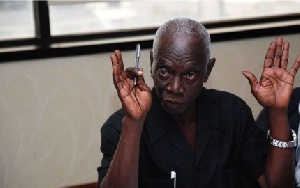General News of Tuesday, 4 June 2013
Source: joyonline
Reject petitioners claim – Afari-Gyan tells court
Afari-Gyan, witness for the Electoral Commission (EC) ended his evidence-in-chief with a firm request to the court to reject the petitioners' claim of annulment of over 4 million votes.
Before coming to this conclusion, he tackled five contentious claims leveled against the Electoral Commission. An eagerly attentive court listened on while the E.C challenged these claims.
First was the electoral mantra “No Verification, No Vote”.
“Yes I said it”, Afari-Gyan admitted to the mantra but added a caveat - this rule was based on certain conditions. He only stated it in principle, he added.
This, he said, meant that each occurrence of non-verification had to be examined “on its own merit”.
He explained that different scenarios could arise that may demand an exception.
“If I notice on the face of the pink sheet that there appears to be excess vote, I will subject it to close scrutiny before deciding.
I will look at the ballot papers and look at whether they fell in the range of serial numbers on the ballot paper”.
He said before annulling particular results on the pink sheet, “certain tests had to be carried out to be 100% certain that there was over-voting”.
He continued that, with the introduction of biometric registration and verification machines, previous counter-accusations between political parties on alleged over-voting had been effectively dealt with.
There was “nowhere in Ghana has it been shown that over-voting occurred”, the E.C claimed.
By over-voting, he meant classical over-voting, a number of voters being more than the number on the register.
Claim 2: Presiding Officers not signing pink sheets
He said the commission's analysis showed that pink sheets unsigned by the presiding officer represented 3.5% of the total pink sheets. However, in a situation where presiding officers did not sign, it was an irregularity. But if party agents signed without the presiding officer’s signature, the commission accepted the results.
Claim 3: Same polling stations, but different results
Afari-Gyan also explained that polling stations with two pink sheets and different results was because of special voting. The petitioners claim that this was an irregularity which called for annulment was untenable.
Claim 4: Same serial numbers, different polling stations
In another relief, the petitioners have said there were same serial numbers on pink sheets for different polling stations, which meant the results should be annulled. But Afari-Gyan insisted: “Serial numbers have no significance in the preparation and collation of results”.
Claim 5: 22 ghost polling stations
The 22 ghost polling stations alleged by the petitioners was not true. There were no such extra polling stations apart from the 22,006 polling stations that formed the basis of their declaration.
Contrary to claims by the petitioners, the E.C said every polling station was supplied with a biometric verification machine. Where the BVM broke down, voting was postponed to the next day.
On these basis, Dr Afari-Gyan said: “the reliefs should not be granted because, in the view of the commission, no firm basis has been shown to merit the grant of those reliefs”.
Afari-Gyan’s evidence-in-chief has lasted for three days. He was led by Quarshie-Idun.











